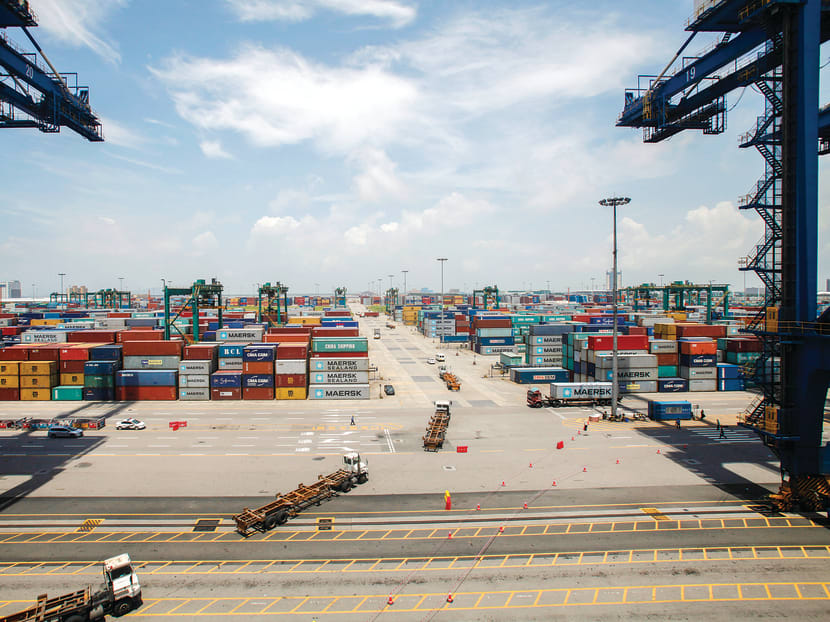Reform or face hard landing, IMF warns China
BEIJING — China faces a hard landing before the end of the decade unless policymakers implement the vital structural reforms that will make growth sustainable over the long term, the International Monetary Fund (IMF) has warned.

Containers being transported at Nansha port in Guangzhou. The IMF has urged China’s policymakers to step up efforts to move the economy away from its over-reliance on investment and exports to drive growth and shift the balance towards consumption.
PHOTO: REUTERS
BEIJING — China faces a hard landing before the end of the decade unless policymakers implement the vital structural reforms that will make growth sustainable over the long term, the International Monetary Fund (IMF) has warned.
In its annual health check of the Chinese economy, the IMF recommended that China target growth of less than 7 per cent next year in order to reach its goal of “transitioning to a safer and more sustainable growth path”.
The IMF urged policymakers to step up efforts to move the economy away from its over-reliance on investment and exports to drive growth and shift the balance towards consumption. It also repeated its call for China to open up its economy, allow the yuan to move with market forces and take further steps to rein in the country’s credit boom.
The IMF said without a change in the pattern of growth, the risk of a hard landing and depressed growth for a protracted period of time was medium to likely before 2020. Although heavy state influence meant the risk of a near-term growth shock was low, the IMF said growth could slow to around 4 per cent by 2030 “with considerable risk of an even sharper slowdown” to about 2.5 per cent.
“Repeated reliance on credit and government intervention to prop up growth without reforms would boost near-term growth, but reduce future growth and exacerbate vulnerabilities, increasing the risk of a disorderly adjustment, stalling the convergence process and adversely affecting the global economy,” the IMF said.
The IMF believes China will grow by 7.4 per cent this year and 7.1 per cent in 2015, but recommended that policymakers target growth of between 6.5 per cent and 7 per cent next year. Its report noted that “a few directors considered a lower target more appropriate”.
China fixed its annual economic growth target for this year at about 7.5 per cent, suggesting for the first time in years that there is room for growth to come in slightly under the desired level.
But after a weak start to the year, the government announced a flurry of stimulus measures to offset the drag from weak exports and a cooling property market, by bringing forward railway spending, cutting reserve requirements for some lenders and reducing taxes.
Though officials describe such measures as fine-tuning, Beijing has steadily broadened the scope and depth of its assistance, as indicated by a surge in bank lending.
“The government’s stimulus policy is strong enough now, but reforms that enhance the internal impetus of the economy still lag,” Mr Zhang Bin, senior economist at the Chinese Academy of Social Sciences, a top government think-tank in Beijing, told Reuters earlier this month. “The pace of reforms this year has been slow. We should be vigilant about the risk of reforms being delayed,” another government economist told Reuters.
The fallout of the 4 trillion yuan (S$808.3 billion) stimulus during the 2008-09 global financial crisis shows the risk of putting off reform.
While China got through the crisis largely unscathed, the stimulus created conditions for local governments to build massive debts and sent property prices rocketing. To that end, the IMF repeated an earlier recommendation that China should not deploy any economic stimulus unless GDP growth is in danger of falling “significantly” below the target level.
China is not expected to announce its 2015 target until early next year but most Chinese government economists, however, doubt Beijing would slash its growth target to below 7 per cent next year for fear of undermining financial stability and market confidence.
Mr Zhu Baoliang, chief economist at State Information Centre, a top government think-tank in Beijing, said he expected the 2015 growth target to be around 7 per cent.
“We should set a target of around 7 per cent for next year and maintain the target for a number of years,” he told Reuters. “But we cannot cut the target by one percentage point next year, that may have a big impact,” he said, warning that a sharp slowdown could hit fiscal revenues and the financial sector. AGENCIES





